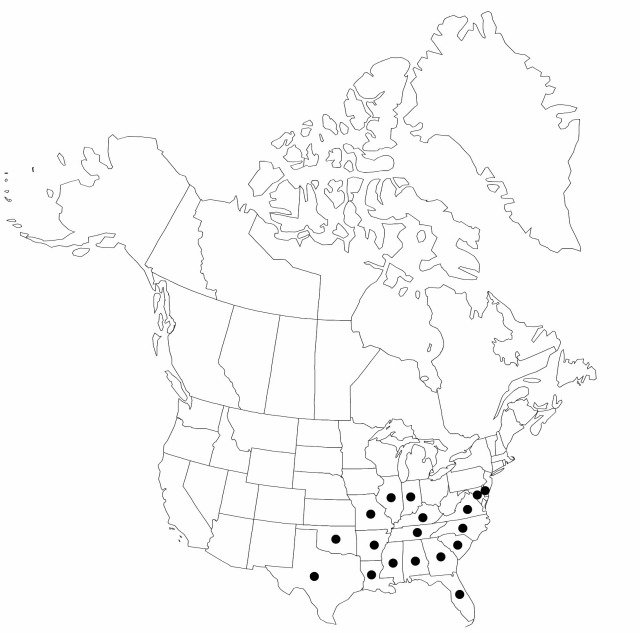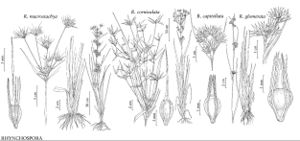Rhynchospora corniculata
Ann. Lyceum Nat. Hist. New York 3: 205. 1835.
Plants perennial, cespitose, 100–150(–200) cm, coarse; rhizomes absent. Culms stiffly erect, leafy, triangular, multiribbed; principal leaves overtopped by culm; blades flat, 3–20 mm wide, apex attenuate, trigonous. Inflorescences terminal and axillary, diffuse clusters of corymbs, fascicles turbinate to hemispheric; bracts often overtopping clusters. Spikelets few to several per cluster, brown or reddish brown, lanceoloid, 10–15 mm, apex narrowly acute; fertile scales broadly lanceolate, (7.5–)10–13(–14) mm, apex acute, midrib shortexcurrent or not. Flowers: perianth bristles 5–6, longest reaching to or slightly beyond fruit midbody, antrorsely barbellate. Fruits 1(–2) per spikelet, 13–20(–25) mm; body oblongellipsoid, compressed, 4–5(–6) × 2–3 mm, base narrowed, short, margins thickened, often crimped, surfaces concave, striate, minutely cancellate or pebbled; tubercle subulate, 2-grooved, 10–15(–20) mm, scabridulous. 2n = 18.
Phenology: Fruiting summer–fall.
Habitat: Swamps, marshes, and shallows, mostly in basic to circumneutral, silty or muddy open sites
Elevation: 0–400 m
Distribution

Ala., Ark., Del., Fla., Ga., Ill., Ind., Ky., La., Md., Miss., Mo., N.C., Okla., S.C., Tenn., Tex., Va.
Discussion
Specimens of Rhyncospora corniculata with base of the tubercle fully as wide as the fruit and with fruit bodies at the lower length range were treated by M. L. Fernald as R. corniculata var. interior Fernald.
The percent of fruit with crimped margins in Rhynchospora corniculata increases westward in the Gulf coastal plain; toward Mexico it is sympatric with R. indianolensis and R. gigantea, which also have crimped fruit.
Selected References
None.
